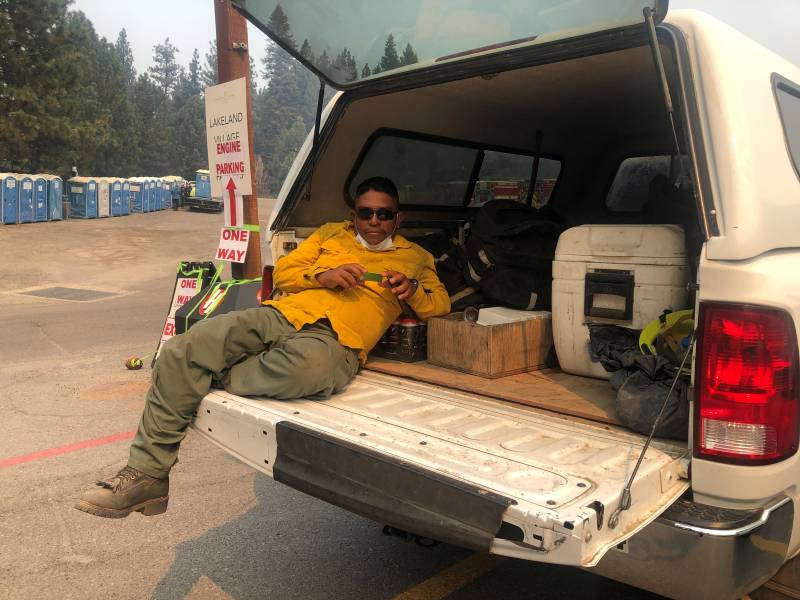Depending on where they’re assigned on the sprawling fire, he plans on tracking them down. Otherwise, he’ll see them back in his hometown in Morelia, a ranchito of only 800 people.
“The work there is mostly in the fields, growing corn, avocados, sawmills,” he said.
Entry-level contract firefighters on hand crews typically make about $15-$16 per hour, plus lots of overtime. Hand crews do the hard work of containment, hiking the steep hillsides to cut fire lines with hoses and Pulaski axes.
Lounging on a tailgate next to Aguilar was Casimiro Calvario Dominguez, who’s working his first season as a firefighter.
“The work in Mexico is harder and pays less,” he said. “I’m not saying we make money sitting around here. We’re working, but it’s more relaxed.”
Calvario Dominguez used a choice Mexican curse word to sum up his dilemma: Leave his family to earn wages paid in dollars so he can provide for them, or stay and work himself into the ground while still earning too little to feed them. Firefighting is tough, he said, but the dollars he makes here support four kids, a wife and his parents.
Despite the risks, he’s grateful for the steady work. So far, he’s been able to stay safe, healthy and ready to work.
This is the nature of fighting a major wildfire. People converge from all over the continent to engage in perilous labor: contractors, pilots and thousands of workers.
One of the crew’s bosses, Manuel Carrillo, is from Porterville, in the Central Valley, and he had to brush up on his Spanish to communicate with the 20 men who work for him.
“My crew is very strong, passionate — very good men, hard workers,” he said. “They’ve taught me a lot, how to work hard.”
As the boss on the ground, his responsibility is to keep his crew members safe. That was hard in Greenville, when the Dixie Fire blasted through.
“I’m always looking out for them as they’re working, looking up above for trees, buildings and dangerous things that could explode, like propane tanks,” he said.
The risks his crew had to take and the losses that the town of Greenville suffered stick with him. Firefighters, no matter what their citizenship, should be paid more for the risks they take to defend homes, he said.
“It’s exhausting. You’re dirty, sweaty — grease, oils, smoke. You got to keep your mental coolness, and direct the crew in the right path and make sure we’re all going home to our families.”
Carrillo is half Mexican American, half Native American from the Santa Inez band of Chumash Indians.
“What I’ve been told is that I’m Mother Earth’s protector. I’m helping calm these fires down, stop them from burning our lands,” he said, adding that his company does forest restoration work in the winter.
“We help build these forests all over again, from the ground up until these trees are hundreds of feet tall.”
He relishes not only the adventure of firefighting, but also his role as protector of the wildlands. While his job is to save homes, those same dwellings are encroaching on the land that he loves, and that his crew members have come to appreciate.
“Having these cities in the heart of these forests. That’s where it hurts, because we see animals, once in a while we’ll run into them, burned alive,” he said.
Everyone on his crew is curious to see which will end sooner, their work visas or this ferocious fire season.

